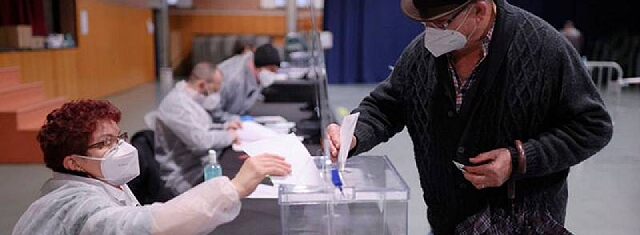Politics
Socialists win the Catalan elections, but the independence achieves majority
Regional elections

(Source: RTVE)
USPA NEWS -
The Socialist Party won the regional elections in Catalonia this Sunday, but the Spanish electoral system, which is transmitted to the regions, caused the Socialists to tie seats with the second most voted party, the Republican Left of Catalonia (ERC in its initials in Catalan), defender of independence. The sum of other pro-independence parties gives the supporters of secession a majority in the Catalan Parliament.
Despite this, the socialist candidate and former Minister of Health of the Spanish Government, Salvador Illa, expressed his intention to stand for the investiture, even knowing that he will not be elected because among ERC, the third most voted party (Together for Catalonia, JxCat in its initials in Catalan), the far-left coalition CUP and En Comú Podem, a branch of the Podemos coalition that governs in Spain together with the Socialist Party, add 82 seats, well above the 68 necessary to obtain an absolute majority. "Catalonia has made history," ERC candidate Pere Aragonés said in an appearance before the media. "For the first time, the independence movement exceeds 50% of the votes," he added.
The Socialist Party won 33 seats, the same as ERC. In third place, Together for Catalonia won 32 seats. The novelty was that the far-right formation VOX achieved, for the first time, representation in the Catalan Parliament, with 11 seats. Behind, with 9 seats, was the CUP, while En Comú Podem won 8 seats, the centrist Citizens party won 6 seats and the conservative Popular Party, in last place, barely won 3 seats.
The big losers in the Catalan elections were Citizens, which lost 30 seats, and the Popular Party, which lost one. "Our result is very bad because we have not achieved the two objectives: to grow and achieve a parliamentary group," admitted the conservative candidate, Jorge Fernández. The secretary general of the Popular Party, Teodoro García Egea, was more forceful in recognizing that "independence is stronger and constitutionalism weaker," although he immediately clarified that "the Catalan elections have never been extrapolated to the national level."
The elections were held in the midst of the coronavirus pandemic, among great security measures but without incidents. At 11 a.m. this Sunday, three hours after the polling stations opened, 100% of the polling stations were constituted. The organizers had established time slots for people at risk of contagion by coronavirus, the sick and citizens in general to vote. Despite this, turnout at six in the afternoon had dropped by 22.5% compared to the previous elections. Fear of the coronavirus affected turnout, as evidenced by the significant increase in vote by mail.
Liability for this article lies with the author, who also holds the copyright. Editorial content from USPA may be quoted on other websites as long as the quote comprises no more than 5% of the entire text, is marked as such and the source is named (via hyperlink).





